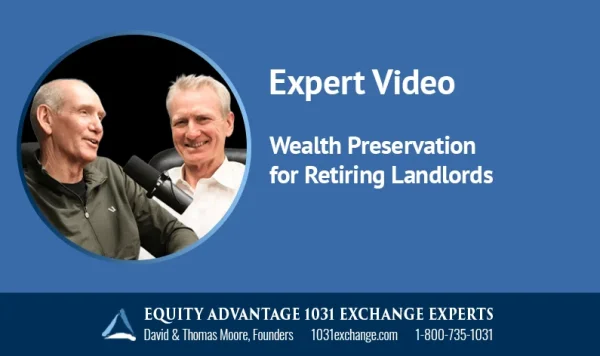
NATIONWIDE 1031 EXCHANGE FACILITATION SINCE 1991
In today’s world it matters little whether you are across the street or across the country; Equity Advantage is here to serve you and your 1031 investment needs.
NATIONWIDE
1031 EXCHANGE FACILITATION
SINCE 1991
In today’s world it matters little whether you are across the street or across the country; Equity Advantage is here to serve you and your 1031 investment needs.
You want to protect the equity in your investments and have the freedom to pursue your goals. You can trust 1031 Exchange intermediary services to get deals done by delivering secure solutions uniquely designed to maximize the potential of your 1031 Exchange.
You’ve worked hard for your money,
we work hard to keep it yours!
Why choose EA as your Qualified Intermediary (QI)?
We’re experts in 1031 Exchanges, an IRS-authorized process that lets you Exchange like-kinds of property - while deferring tax liability.

Enjoy More Flexibility
The professionals at Equity Advantage will show you how a 1031 Exchange empowers you to move from investment to investment, while keeping your equity intact.

Defer Your Tax Liability
Instead of facing taxes of a third or more on your gain with a sale of your investment property, put that money into a new investment with a 1031 Exchange.

With You Every Step of the Way
Since 1991 we’ve facilitated the full range of Exchanges. Our team includes experts in taxation and investment analysis, contract law, escrow, and real estate.
Whether utilizing a Delayed, Reverse or Improvement Exchange
we have the experience and expertise necessary to get the difficult deal done.
Ted Calouri
![]() I have used Equity Advantage for years and always been impressed with their knowledge and efficiency.
I have used Equity Advantage for years and always been impressed with their knowledge and efficiency.![]()
Ted Calouri
Calouri Properties
Chris Cataldo
![]() Equity Advantage is a very efficient, experienced and reliable company for 1031 Exchanges. I have used them twice on my own deals and been highly satisfied. I would recommend them to anyone contemplating a 1031 Exchange.
Equity Advantage is a very efficient, experienced and reliable company for 1031 Exchanges. I have used them twice on my own deals and been highly satisfied. I would recommend them to anyone contemplating a 1031 Exchange.![]()
Chris Cataldo
Engel & Völkers
Himanshu M. Patel
![]() After a long 6-7 month period, we have now officially closed on both properties and have completed the 1031 Exchange with a full deferral.
After a long 6-7 month period, we have now officially closed on both properties and have completed the 1031 Exchange with a full deferral.
I want to personally thank you and the rest of your team, from Rachel to Sheila to Alexis to Tom, etc., for educating me and guiding me through this entire process. You and your team were nothing short of absolutely amazing during this entire time. Each time I had a question and you were not available, I was put in contact with the right person.
Once again, a sincere thank you to you and your team!!
P.S., if you are ever in Miami, please give me a call. I will do the same when I come up to Portland.![]()
Himanshu M. Patel
Miami, Florida
Glenn Micallef, GAS
![]() I want to let you know how satisfied I am with the way my reverse 1031 Exchange has been handled by you and your staff. In particular I would like to commend Rachel Kotkin for her knowledge and attentive customer service. She always responded to my queries immediately and had the answers I needed to have confidence in a process that I was unfamiliar with.
I want to let you know how satisfied I am with the way my reverse 1031 Exchange has been handled by you and your staff. In particular I would like to commend Rachel Kotkin for her knowledge and attentive customer service. She always responded to my queries immediately and had the answers I needed to have confidence in a process that I was unfamiliar with.
Your firm does exactly what you advertise and you all do it well indeed.
Many thanks for handling this for me. I would certainly recommend Equity Advantage to anyone looking for the best professional guidance for 1031 Exchanges.![]()
Glenn Micallef, GAS
Portland, Oregon
A & D
![]() Diane and I would like to thank you for your hard work in accomplishing this Exchange. You gave us excellent advice, and we appreciate the time you took to explain the process. I am glad that my nephew recommended you. If the opportunity arises I would gladly use your services again.
Diane and I would like to thank you for your hard work in accomplishing this Exchange. You gave us excellent advice, and we appreciate the time you took to explain the process. I am glad that my nephew recommended you. If the opportunity arises I would gladly use your services again.![]()
A & D
Portland, Oregon
John Biniewski
![]() My clients have used Equity Advantage, Inc. in the past and have done a great job regarding Property Exchanges.
My clients have used Equity Advantage, Inc. in the past and have done a great job regarding Property Exchanges.![]()
John Biniewski
Portland, Oregon
MORE Realty
Resources
Latest News – Videos – Educational Opportunities
1031 Exchange Opportunities
Call today to speak to the 1031 Exchange experts.
Our Team
For three decades, we’ve been the 1031 Exchange experts.
We’ll help you with contracts, consult with you on taxation, evaluate investments, and most importantly partner with you.

David Moore, CEO, founded Equity Advantage with his brother Tom in 1991, after a successful real estate investment career. David is a nationally recognized expert on 1031 Exchanges and a former board member of the Federation of Exchange Accommodators. David is a Certified Exchange Specialist (CES).
Thomas Moore is the President of Equity Advantage and a cofounder, with his brother David. Tom takes great pride in the firm being a true resource for clients, pointing to the number of repeat clients the firm has. He is a graduate of UC San Diego.
We are here to answer your 1031 Exchange questions.
It’s important for our clients to understand the process they are about to go through before they actually begin an Exchange. For this reason, we’re only a phone call away, plus we offer classes and a wealth of 1031 Exchange reference materials on our website.
A 1031 Exchange is an IRS-authorized process where like-kind business or investment properties are Exchanged without immediate tax liability to the property owner (Exchangor).
The IRS requires that an Exchangor use a neutral third party, known as an intermediary or accommodator, to facilitate a 1031 Tax Free Exchange. Equity Advantage, Inc. is a qualified intermediary agency able to properly assess the current 1031 Exchange rules and assist Exchangors with the process.
Read More »
Call Equity Advantage today for answers to your 1031 Exchange questions.
800-735-1031
1031 Exchange Video Blog
1031 Exchange expert, David Moore CEO of Equity Advantage, answers all you need to know about 1031 Exchanges. Watch or read the latest information regarding 1031 opportunities, best practices, and expert tips.
1031 Exchange Ask the Experts
David Moore, Equity Advantage CEO teams up with industry experts to answer questions they are most asked by clients about 1031 Exchanges, market trends and opportunities in this video series. Watch, listen or read, to find out what the experts have to say.
1031 Exchange News and Continuing Education Classes
Your source for the latest 1031 Exchange news and free continuing education opportunities. Stay in the know and learn from the experts.












